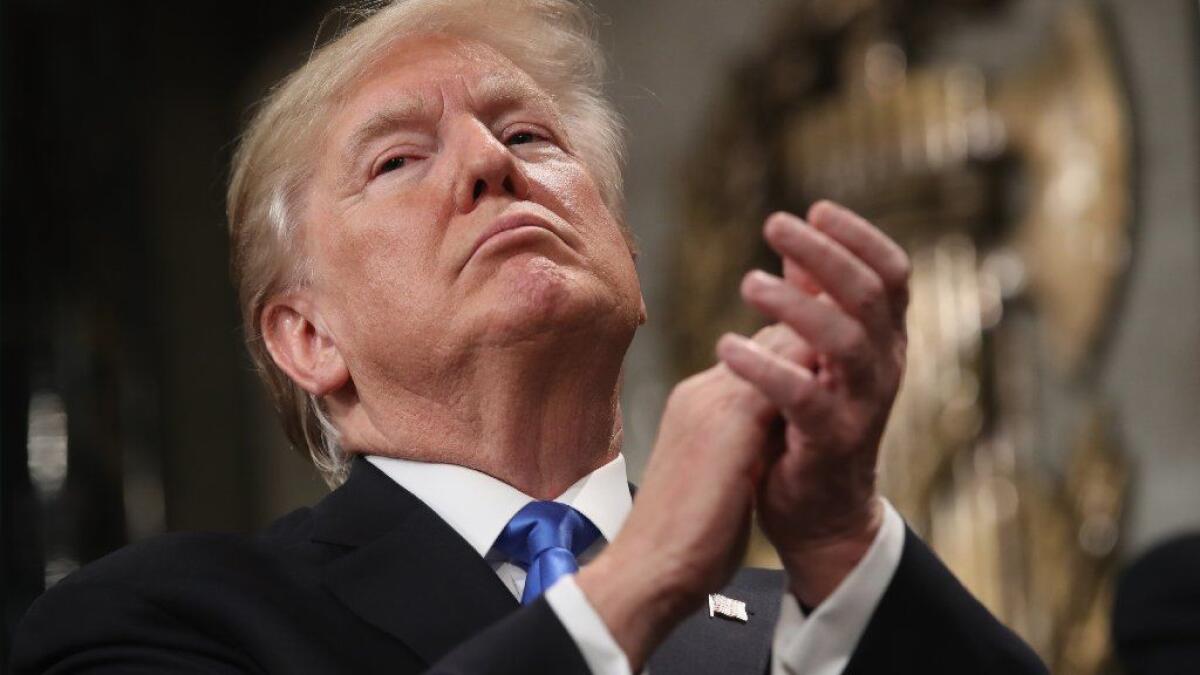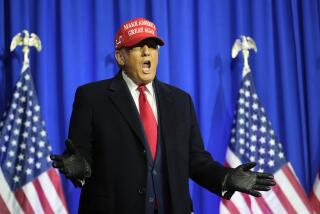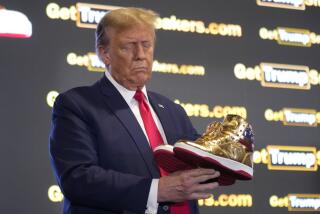Column: Trump once again vows to lower drug prices, and once again you shouldn’t believe him

President Trump told some whoppers in this week’s State of the Union speech: His tax cuts were the biggest ever (they weren’t), he has added 2.4 million new jobs (only if you count former President Obama’s last few months in office), wages are finally rising (they’ve been slowly but steadily climbing for years).
But the one that really got my attention was Trump’s declaration that he’s committed to addressing “the injustice of high drug prices.”
“One of my greatest priorities is to reduce the price of prescription drugs,” he said. “In many other countries, these drugs cost far less than what we pay in the United States.”
And then came a typically Trumpian promise that seemed to be off-script but was in keeping with pledges he’s made in the past: “And prices will come down substantially. Watch.”
Who does he think he’s kidding?
Trump undoubtedly knows this issue plays well with focus groups on both sides of the ideological fence. But, after a year in office, he has made no effort to tackle runaway drug prices.
If anything, he’s gone completely in the other direction by appointing as Health and Human Services secretary a former drug industry executive who oversaw huge increases in his company’s prices, including a doubling of insulin prices.
In fact, Alex Azar was asked during his confirmation hearing if, while running U.S. operations for Indianapolis drugmaker Eli Lilly & Co., he lowered the price of a single drug.
“I don’t know that there is any drug price of a branded product that has ever gone down from any company on any drug in the United States,” he replied, suggesting such an idea runs counter to every capitalistic principle this country stands for (#MAGA).
I spoke with a number of healthcare experts after Trump’s speech. Not one of them expressed the slightest optimism that the president was serious about lowering drug prices or was prepared to take the steps needed to accomplish this goal.
Jesse David, who heads the Los Angeles office of consulting firm Edgeworth Economics, described Trump’s commitment to lower drug prices with an epithet involving the defecatory output of cattle.
When I asked for a more family-friendly response, he called Trump’s stance “an assertion divorced from any political reality.”
That’s because we know from the experiences of other developed countries — where, as Trump said, citizens pay a fraction of what Americans pay for prescription meds — that drug prices can be reduced, but it requires a firm government role in limiting what pharmaceutical companies charge.
Chief among these methods is having state-run insurance plans negotiate lower prices. In the United States, the largest such plan, Medicare, is prevented by law from haggling prices with manufacturers. And Republican lawmakers have consistently opposed any move to change that.
Another approach would be to allow Americans to purchase prescription drugs manufactured in the U.S. and sold in other countries for far less than domestic prices. So-called drug reimportation is against the law and lawmakers from both parties, beholden to pharmaceutical money, have fought to keep it that way.
Then there’s straight-out price caps on branded drugs, which a number of other nations use to prevent much-needed meds from being out of reach for all but the wealthiest patients. In one glaring example, the Hepatitis C drug Sovaldi sold for $1,000 a pill in the U.S. but just $4 per pill in India.
“Trump didn’t mention any of these things,” David said. “All he really said is that when he’s in charge, the world gets better.”
David said his views are his own and don’t necessarily reflect those of his firm.
The United States is by far the biggest spender on pharmaceutical products. The average American shells out more than $1,026 annually, according to the 35-member Organization for Economic Cooperation and Development.
That’s double the OECD average of $515 and considerably more than economic peers such as Germany ($678), France ($596) and Australia ($590).
There’s no mystery to how these other countries do it. They employ one or more of the above methods, basically acting from an awareness that a “free market” for drugs isn’t necessarily conducive to public health.
“The president doesn’t understand that this is complicated,” said James C. Robinson, director of UC Berkeley’s Center for Health Technology.
Moreover, he said, “Republicans philosophically don’t like anything that smacks of price regulation.”
Which is why Trump’s repeated claims to be a foe to high drug prices merits that thing about cattle output.
Yes, he can point to recent efforts by the Food and Drug Administration to accelerate approvals for generic meds, which can help bring down overall drug spending.
But when most people talk about crazy-high drug prices, they’re referring to things like the $1,000 Sovaldi pills, or the price of life-saving EpiPens being raised to nearly $500 from $60, or the AIDS drug Daraprim skyrocketing overnight to $750 a pill from $13.50.
Since his days on the campaign trail, Trump has said he’s determined to do something about situations like that. But he has also made remarks that demonstrate a less-than-rigorous understanding of the global pharmaceutical market.
“We want to bring our prices down to what other countries are paying, or at least close and let the other countries pay more,” Trump commented in October.
Um, yeah.
“Given the background of the new HHS secretary and the pro-corporate orientation of this administration, I doubt that any serious structural changes will occur,” said Joel W. Hay, a USC pharmaceutical economist.
“There may be some symbolic, high-profile jaw-boning of specific notorious cases, including publicly taking some pharma CEOs to the woodshed,” he said. “After a few months, they’ll quietly go back to normal operations.”
That’s why it’s foolish to take Trump at his word when he says he’ll make a reduction in drug prices “one of our top priorities.”
This is basically the same thing he said in 2016 when he pledged, “I’m going to bring down drug prices.”
He hasn’t.
He won’t.
David Lazarus’ column runs Tuesdays and Fridays. He also can be seen daily on KTLA-TV Channel 5 and followed on Twitter @Davidlaz. Send your tips or feedback to david.lazarus@latimes.com.







